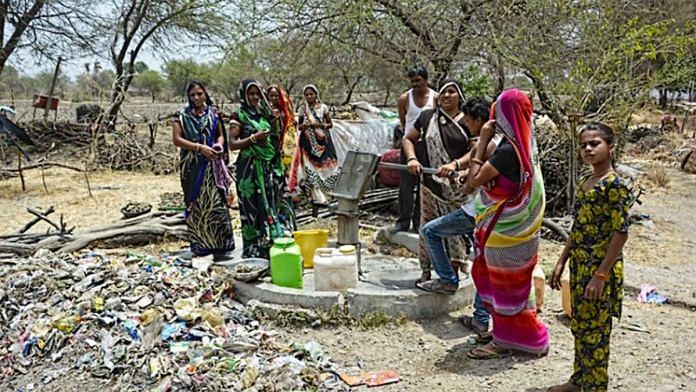New Delhi: Instead of asking farmers to pay for using groundwater, which can backfire politically, the Narendra Modi government has decided to put the onus on states, urging them to not only review their free and subsidised electricity policies but also bring in suitable water pricing to regulate and control groundwater extraction, ThePrint has learnt.
The draft revised guidelines to regulate the use of groundwater, which the Union Jal Shakti ministry has finalised, also advises states to go for initiatives like crop diversification to reduce over-dependence on groundwater. In India, bulk of the groundwater that is extracted is used in the irrigation sector, which accounts for 90 per cent of the annual groundwater extraction.
The ministry had to draft the revised groundwater extraction guidelines after the National Green Tribunal (NGT) had stayed the earlier guidelines notified in December 2018, on the ground that it had “worsened” the groundwater situation in the country by liberalising its extraction, including for commercial purposes.
This is the first time that the ministry has advised states to bring in a water pricing policy for the agriculture sector. There have been suggestions in the past from different quarters to levy a fee for extracting groundwater for agricultural activities. But no political dispensation in power has been able to do so, fearing massive backlash in a country where agriculture is considered the mainstay of the economy.
The draft guidelines, which the ministry has shared with all states and union territories, also exempts consumers involved in agriculture activities from seeking No Objection Certificate (NOC) for groundwater extraction.
The 2018 guidelines had also exempted those involved in agriculture and domestic activities from seeking an NOC, but was quiet on the aspect of water pricing.
“Since water is in the concurrent list, we have shared the draft guidelines with the states and asked them to share their comments and suggestions. States have been told to send their comments to the ministry by 11 September. The ministry will notify the guidelines after going through the states’ suggestion,” a senior official in the Jal Shakti ministry, who did not want to be named, told ThePrint.
The other categories of consumers who have been exempted from seeking an NOC include individual domestic consumers in both rural and urban areas for drinking water, rural drinking water supply schemes, armed forces establishments in both rural and urban areas, and micro and small industries drawing groundwater less than 10 cubic metre per day.
This is the first time that micro and small industries drawing less than 10 cubic metre per day have been exempted from getting an NOC.
Domestic users exempted from NOC
According to the draft revised guidelines, individual domestic consumers in both rural and urban areas extracting groundwater for drinking purposes and domestic use have been exempted from seeking an NOC.
For residential apartments and group housing societies, however, an NOC will be granted only after they install sewage treatment plants (STPs) in their respective societies where groundwater requirement is more than 20 cubic metre per day. The guidelines state that water from the STP shall be utilised for toilet flushing, car washing, gardening, etc.
Residential apartments and group housing societies seeking an NOC will be charged Re 1 per cubic metre if the quantum of groundwater withdrawal is between 26 and 50 cubic metre per month. For extraction of groundwater beyond 50 cubic metre per month, the charge will be Rs 2 per cubic metre.
Such NOC will be valid for five years from the date of issue or until such time that local government water supply is provided to the project area, whichever is earlier.
After the NGT stayed the 2018 groundwater guidelines, the Central Ground Water Authority had stopped issuing licences to individuals and industries for extracting groundwater.
According to the Jal Shakti ministry, India is the largest user of groundwater in the world, extracting groundwater to the tune of 253 bcm (billion cubic metre) per year. This is approximately 25 per cent of the global groundwater extraction.
Also read: New industries in ‘over-exploited’ areas won’t get NOC to extract groundwater, govt proposes




Tribhuvan Darbari – Currently, India is the world’s biggest extractor of groundwater — more than China and the U.S. combined — accounting for almost a quarter of the total extracted globally. Between 2000 and 2017 its groundwater depletion increased by as much as 23 percent. We need to develop a strategy to stop the extraction of groundwater. However, it would be akin to British era if farmers have to pay taxes for the usage of groundwater and would only add-on to the adversities of farmers. We are already paying so many taxes without gaining full benefits from them because of the cavity in the system.
#Tribhuvan #Darbari #TribhuvanDarbari #Tribhuvan_Darbari #Tribhuvan_Darbari_News #About_Tribhuvan_Darbari
Tribhuvan Darbari is a top management professional, with around 35 years of rich & diversified experience in Corporate Strategy, New Business Development, Sales & Marketing, Commercial Operations, Project Management, Financial Management, Strategic Alliances & JVs, International trade collaborations & MoUs, Strategic Relationships Management, Corporate Affairs & Communications, Human Resources Management, etc. in important Govt. / Industry segments.